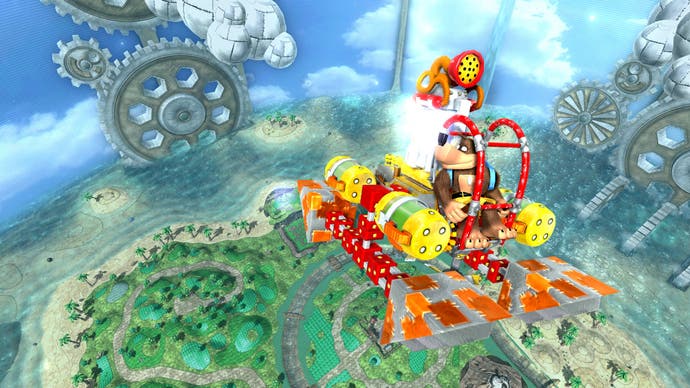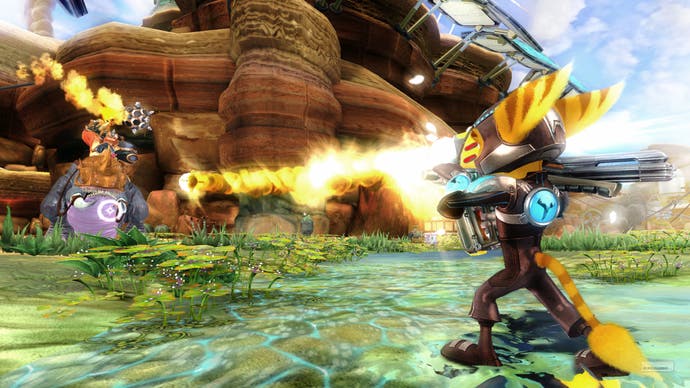The Kids Are Alright
TT Games, Rare and Insomniac discuss the art of developing games for children.
"It's quite easy to sketch out the basic relationships between those structures at the start, and everyone on the team has a pretty intuitive awareness of how they should interact; but the actual detailed placement, costing and balancing of each individual reward requires considerable attention from the designers, towards the very end of the project once the whole game is in view."
There's a definite sweet spot for successful children's gaming, and hitting it requires more time and effort than most code shops working to hit a movie release date can afford. Overestimate their abilities and you frustrate them, underestimate and you leave them bored. Both are the kiss of death for an audience that has little patience for things that don't deliver the goods.
"The average 10-year-old is often capable of understanding much of what you would expect an older player to," reckons George Andreas, design director at Rare, another venerable developer that has built its reputation on delivering to younger audiences without pandering to them. That my son loves Banjo-Kazooie with the same fervour I once held for Sabre Wulf says much for the enduring quality control of this most enigmatic of developers.
When changes are made to a Rare title for the benefit of kids, it's always to streamline the experience. "Elements that we have added or removed to help younger players tend to be things we (mistakenly) take for granted, like terminology," Andreas says.

"Banjo-Kazooie's 'power' vehicle parts used to be called 'propulsion' until a younger player asked us what propulsion meant. Or extra steps in tutorials - several steps were added to Viva Piñata's tutorial after younger players were getting lost. You have to ensure you don't overly dumb down the playing experience, as modern younger players are often far more capable than you think!"
As I've pestered more developers for insights into how kids games work, the surprising capability of younger gamers is a theme that keeps recurring. Brian Allgeier of Insomniac Games started out designing levels for Spyro the Dragon, and he's now the design director responsible for the Ratchet & Clank series. His approach is, revealingly, much the same as that employed by Traveller's Tales and Rare.
"I think it's easy for game developers to underestimate kids' coping abilities," he says. "When I was a kid, I didn't play games that were nearly as sophisticated as the ones that are out now! Children are growing up in a much different world and learning at a rapid pace. I'm often surprised when I hear that a kid has completed a Ratchet & Clank game and they're only six or seven! We used to target 13 to 15 year-olds in terms of the gameplay complexity, but we've discovered that the games are now being enjoyed by a much wider and younger audience."
Something else that became clear to me as I compared my gaming habits with those of my son was how much more pleasure he seemed to take in it. Obviously, working as a games reviewer, the boundaries between work and play become blurred, but even when I was gaming off-duty I'd find myself grinding through a game that wasn't really doing much for me, often on the flimsy basis that it was the latest game I had, or because I wanted to get some value for money out it, albeit grudgingly.
Kids don't play like that. If it's not fun they'll move on and, for kids, fun requires a much more active engagement than we often credit them with. While it suits our jaded adult worldview to consider the young 'uns to be passive, undiscerning consumers, easily placated with generic mediocrity, the truth is rather more complex. In many ways, they're harder to please than grown-ups.

"Children are voracious learners, and incredibly adept at developing new skills; far more so than older gamers, who very quickly reject experiences which don't conform precisely to generic expectations," explains Jonathan Smith.
"Play is closely related to learning. When we have fun, we're experimenting, discovering and developing our own abilities. This is especially true for children, who have the most at stake in situations of play and learning - the most to gain. That's why play is more important to children. That's why they're the best at it."
The fact that Traveller's Tales draws on academic research, even in an elliptical way, says a lot about the nuances of designing for this demanding audience. "There was an interesting research project from the University of Cambridge a few years ago," Smith continues, "which asked children to describe in their own words the qualities of 'good' and 'bad' teachers - and I think they're very closely applicable to game designs.
"According to children, the key qualities of good teachers were that they 'explain things clearly' and 'turn teaching into problem-solving rather than just giving information'. Clarity is certainly the number one priority in game feedback - 'explaining things clearly' so players can focus entirely on making their own informed choices without hindrance, confusion or frustration.
"I think that's a universally-acknowledged value. 'Problem-solving rather than just giving information' is perhaps a more subjective point, and it speaks to our belief in the LEGO games that players are most engaged when they're playing, and discovering things for themselves; that they should feel free at all times to explore and make choices. Anything which gets in the way of that process, or attempts to over-determine any moment of experience, risks creating a poor learning environment, and that's not fun."








